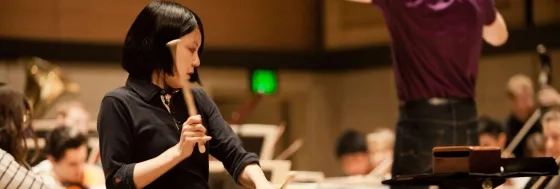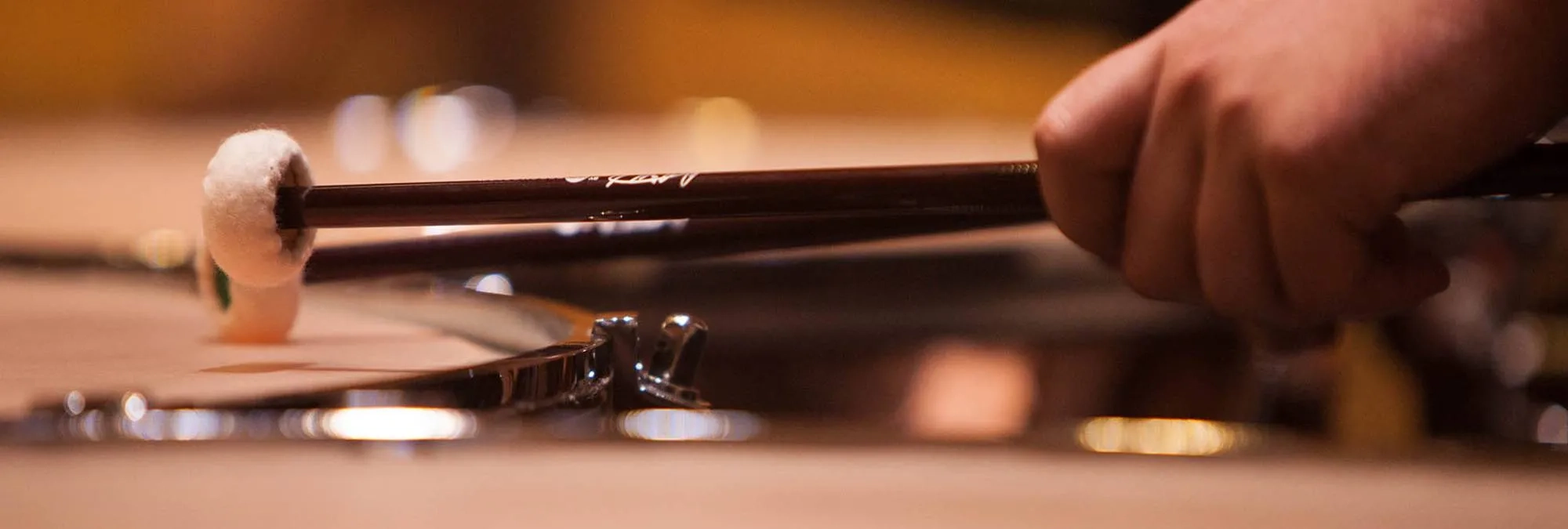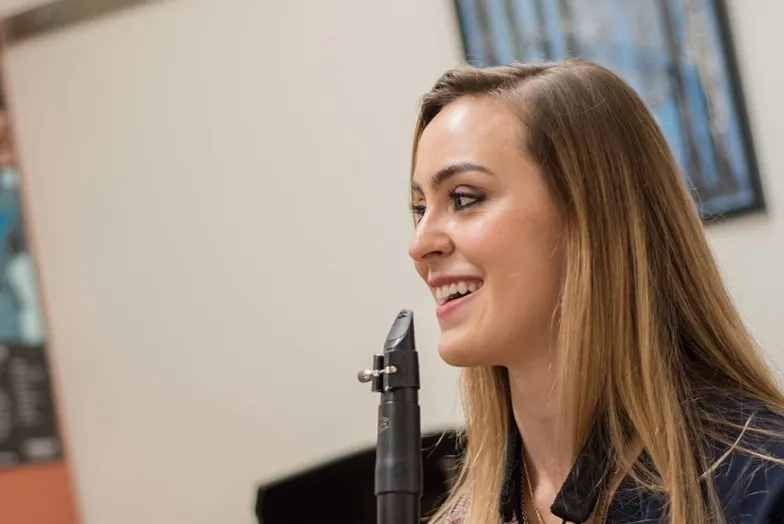Percussion Bachelor of Music Curriculum
Collegiate Apply / Request Information
Life isn’t an audition.
Any music school can make you a better player. Our interconnected courses are built to transform you intellectually, artistically, professionally, and individually. You’ll understand the roots of your music, freeing you to take it somewhere new. You’ll see how your training broadens your options, rather than narrowing them. You'll find your voice. And you'll enter the world with the same confidence you bring to the stage.
Required Courses
Curriculum: Bachelor Degree in Orchestral Instruments (Percussion)
Credit total: 129
| Requirement | Cr. |
|---|---|
| Private Instruction | 32 |
| Performance Classes | 4 |
| Keyboard SKills | 2 |
| Humanities & Sciences | 24 |
| Musicianship & Music Theory | 20 |
| Music History & Literature | 12 |
| Professional Development | 4 |
| Ensemble | 26 |
| Electives | 5 |
| Winter Term | 3 Years |
| Digital Portfolio | 4 Years |
| Juries | 4 |
| Recitals | 1 |
Repertoire Requirements for Percussion Majors
Freshman Jury
Timpani
- Study of basic techniques: strokes, tone, tuning, roll, muffling, cross-sticking
- Goodman Modern Method for Timpani
- Firth The Solo Timpanist, elementary studies
- Orchestral repertoire of classical composers and compositions performed by the Conservatory Orchestra (throughout all years)
Snare Drum
- Survey of all basic strokes, rolls
- Goldenberg Snare Drum Method
- Cirone Portraits in Rhythm
- Peters Intermediate Snare Drum Studies
- Introduction to orchestral repertoire
Mallet Instruments (xylophone, marimba, etc.)
- Study of basic techniques
- Goldenberg Modern School for Xylophone
- Green Studies
- Introduction to orchestral repertoire
- Begin four-mallet technique using Bach and Van Geem Four-Mallet Democracy
Introduction to the techniques of other percussion instruments: bass drum, cymbals, tambourine, triangle, castanets, etc. This survey continues as appropriate throughout the undergraduate years, particularly as necessitated by performance in the Conservatory Orchestra.
Sophomore Jury
Timpani
- Orchestral repertoire of classical and romantic composers.
Snare Drum
- More advanced studies, with emphasis on dynamic control, especially the "pp," the roll at all dynamics, etc.
- Peters Advanced Snare Drum Studies
- Cirone Portraits in Rhythm
- Orchestral repertoire
Mallet Instruments
- Continued study of scales and arpeggios
- Green Studies
- More advanced studies
- Solo material selected from modern composers and classic works transcribed for xylophone, marimba, and vibraphone (Bach violin sonatas and partitas, Bach cello suites, Creston Concertino for Marimba and Orchestra). Begin multiple percussion: Stravinsky L'histoire du soldat, Milhaud Concerto for Percussion
Junior Jury
Timpani
- Orchestral repertoire of all periods, including some modern works
- Solo material (Paris Timpani Concerto, Tanner Timpani Concerto)
Snare Drum
- Cirone Portraits in Rhythm
- Emphasis on metric variations; orchestral repertoire
Mallet Instruments
- Continue Bach violin sonatas, partitas, and cello suites
- Orchestral repertoire (e.g., Gershwin Porgy and Bess, Bernstein, Stravinsky, Bartók)
- More advanced four-mallet study using Van Geem Four-Mallet Democracy
- Study of repertoire of complete percussion family
- Dvořák Carnival Overture (tambourine)
- Liszt Piano Concerto (triangle)
- Mahler Symphony No. 3 (bass drum)
- Tchaikovsky Symphony No. 4 (cymbals)
- Continue technical studies of Green, Bailey
More extensive multiple percussion studies: Dahl Duettino for Flute and Percussion; Kraft Encounters for Trumpet and Percussion
Senior Jury and Senior Recital
- Technical perfection in all areas of percussion performance
- Studies in any of the previously recommended methods as indicated; other advanced methods may be used, such as Abel Twentieth Century Orchestral Studies (timpani); continued survey of solo works and the symphonic and operatic repertoire
The fourth year's study should culminate in a solo jury examination with performance on all basic percussion instruments, including such works as Stout Mexican Dances, Milhaud Concerto for Marimba (or a full-length concerto transcribed for mallets), and Carter Eight Solo Pieces for Four Timpani. If possible, small ensemble works featuring percussion should be included. Suggestions include Bartók Sonata for Two Pianos and Percussion, Kurka Marimba Concerto, Bach sonatas (violin) and lute suites, Stockhausen Zyklus, Crumb Madrigals, and Berio Circles. This jury also could include a first performance of an advanced composition student's work for solo percussion or percussion featured in a small ensemble.
Percussion majors must perform a senior recital to determine fulfillment of performance




